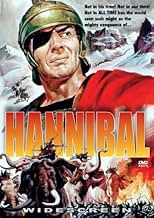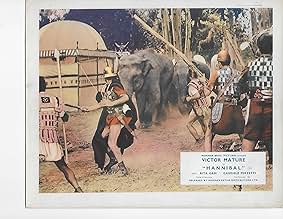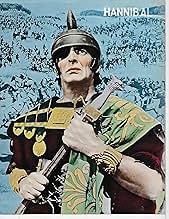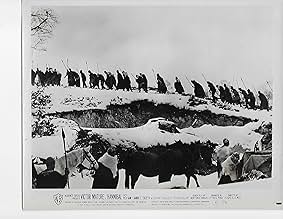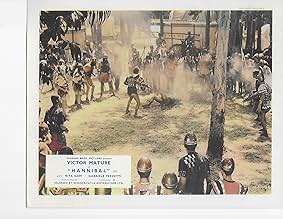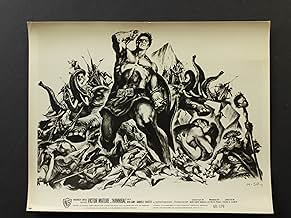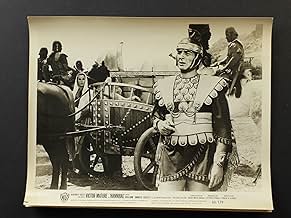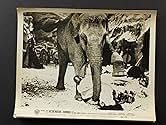AVALIAÇÃO DA IMDb
5,2/10
1,2 mil
SUA AVALIAÇÃO
Durante a Segunda Guerra Púnica em 218 A.C., o general cartaginês Hannibal ataca Roma após cruzar os Alpes com seu exército.Durante a Segunda Guerra Púnica em 218 A.C., o general cartaginês Hannibal ataca Roma após cruzar os Alpes com seu exército.Durante a Segunda Guerra Púnica em 218 A.C., o general cartaginês Hannibal ataca Roma após cruzar os Alpes com seu exército.
- Direção
- Roteiristas
- Artistas
Terence Hill
- Quintilio
- (as Mario Girotti)
Renzo Cesana
- Minucio
- (as Renato Cesana)
Bud Spencer
- Rutario
- (as Carlo Pedersoli)
Avaliações em destaque
I don't know who the hell shot this, but I suppose I could glance at the credits and lay blame on the culprits, but since I'm lazy and irritated right now I'll just skip the formality and say that Victor Mature probably fired his agent several times over after being booked for this gig.
He is quite literally the only competent person thesping his role, all the while other actors are stiff, comical, and otherwise just plain unconvincing. But like I implied in my first paragraph, it's not even the acting (however bad by the supporting cast) that's the issue: It's the cinematography: It's the direction and shot set ups: It's poor scheduling of the extras so the most can be gotten out of them shot wise. It's everything from the awful costumes to the lack of historical accuracy, to the extreme lack of consistent production values.
The battle scenes are so poorly staged that you wonder who the hell was in charge of this thing. The acting, as mentioned, by all other than the lead (Mature) is some of the worst I've seen for a feature film. It's that bad.
Avoid this thing.
He is quite literally the only competent person thesping his role, all the while other actors are stiff, comical, and otherwise just plain unconvincing. But like I implied in my first paragraph, it's not even the acting (however bad by the supporting cast) that's the issue: It's the cinematography: It's the direction and shot set ups: It's poor scheduling of the extras so the most can be gotten out of them shot wise. It's everything from the awful costumes to the lack of historical accuracy, to the extreme lack of consistent production values.
The battle scenes are so poorly staged that you wonder who the hell was in charge of this thing. The acting, as mentioned, by all other than the lead (Mature) is some of the worst I've seen for a feature film. It's that bad.
Avoid this thing.
"Hannibal" is a great movie for nine year-old boys, or at least it was back in 1960 when I sat through it twice at a Saturday matinée. I don't think it had much of a mainstream release, playing mostly to kiddie matinée and drive-in audiences. The film planted in me an interest in this historical period and was my first taste of cinema gore; my one memory being the blood pouring from a soldier's mouth after he was crushed by an elephant during the army's march over the alps.
In style "Hannibal" is like a really bad spaghetti western, only set it 200BC and produced by people generally clueless about just who was their target audience. On one hand the less your sophistication the less energy you will need to burn suspending disbelief. On the other hand the subject matter cries out for a more sophisticated audience interested in history. And finally the awkwardly inserted love story will go unappreciated by both sophisticated and unsophisticated viewers.
Hannibal was a brilliant military tactician from Carthage (now Tunisa) who gave Rome a run for its money as the dominant power two centuries before the birth of Christ. The film was promoted by Warner Brothers as "a fanciful adaptation of history" (make that an extremely condensed adaptation). Given all the omissions it is difficult to understand why they felt compelled to invent a love story. It might have made some sense if they had paid a box office draw actress to star as the title character's love interest; but Rita Gam was an aging bit player, pleasant in a wholesome Dorothy McGuire way but too detuned to add any sizzle to a production desperately in need of some sparks.
After an especially ponderous title sequence a narrator begins the film by getting the audience up to speed on current events (circa 200 BC). Rome is threatening Carthage and Hannibal has decided to head things off by moving his army from Spain to Northern Italy via the Alps. Then we get 15 minutes of the 40,000-man Carthaginian army making its way single file over the icy slopes. The editor cuts it shots of officers shouting, "keep moving," soldiers slipping off the path to an icy death, and the same group of elephants rounding the same fake soundstage boulder. At several points the men must pull themselves up a steep incline with a rope. There are no shots of the elephants, horses, or wagons climbing this rope and this becomes the first of many suspension of disbelief moments; it is unwise to dwell on why the soldiers are subjecting themselves to this dangerous climb since there must be a nearby Roman road for all the animals and baggage.
Hannibal's army emerges from the icy mountain and camps near the country villa of Roman Senator Fabius (Gabriele Ferzetti - despite the name this is not a girl). Fabius is in Rome futilely suggesting that they employ guerrilla warfare and avoid direct confrontation with Hannibal's army. This was in fact the way that the Romans were finally able to rid themselves of the invader but it took them several years to adopt such tactics.
Fabius' son Quintilius (Terence Hill who I've always confused with Terrance Stamp) and niece Sylvia (Rita Gam) are at the villa and Hannibal captures them. Hannibal and Sylvia have a romance and she is released to tell Rome what a big army he has and that he has only crossed the Alps because he wants peace (could have fooled me). Before you know it Hannibal has hurt his eye and Victor Mature spends the rest to the story wearing an eye patch and the Roman Senate spends its deliberations telling pirate jokes.
The elephants get inserted into several poorly edited battle sequences. They lumber around (on occasion they speed up the film to make it look like they are charging) and crush a lot of Romans off-camera and the sound people make noises that make it seem like the straw being thrown toward the elephants are actually arrows.
Then at about the one third point of the actual story they run out of film, the narrator briefly explains that Hannibal never was able to sack Rome, and the ponderous title sequence runs again but this time it is full of credits.
Mature was a horrible actor nearing the end of his career at this point. Since most of the cast are Italians whose lines were dubbed and there is no indication that anyone received acting for the camera direction, the production manages a nice lethargic unity.
Then again, what do I know? I'm only a child.
In style "Hannibal" is like a really bad spaghetti western, only set it 200BC and produced by people generally clueless about just who was their target audience. On one hand the less your sophistication the less energy you will need to burn suspending disbelief. On the other hand the subject matter cries out for a more sophisticated audience interested in history. And finally the awkwardly inserted love story will go unappreciated by both sophisticated and unsophisticated viewers.
Hannibal was a brilliant military tactician from Carthage (now Tunisa) who gave Rome a run for its money as the dominant power two centuries before the birth of Christ. The film was promoted by Warner Brothers as "a fanciful adaptation of history" (make that an extremely condensed adaptation). Given all the omissions it is difficult to understand why they felt compelled to invent a love story. It might have made some sense if they had paid a box office draw actress to star as the title character's love interest; but Rita Gam was an aging bit player, pleasant in a wholesome Dorothy McGuire way but too detuned to add any sizzle to a production desperately in need of some sparks.
After an especially ponderous title sequence a narrator begins the film by getting the audience up to speed on current events (circa 200 BC). Rome is threatening Carthage and Hannibal has decided to head things off by moving his army from Spain to Northern Italy via the Alps. Then we get 15 minutes of the 40,000-man Carthaginian army making its way single file over the icy slopes. The editor cuts it shots of officers shouting, "keep moving," soldiers slipping off the path to an icy death, and the same group of elephants rounding the same fake soundstage boulder. At several points the men must pull themselves up a steep incline with a rope. There are no shots of the elephants, horses, or wagons climbing this rope and this becomes the first of many suspension of disbelief moments; it is unwise to dwell on why the soldiers are subjecting themselves to this dangerous climb since there must be a nearby Roman road for all the animals and baggage.
Hannibal's army emerges from the icy mountain and camps near the country villa of Roman Senator Fabius (Gabriele Ferzetti - despite the name this is not a girl). Fabius is in Rome futilely suggesting that they employ guerrilla warfare and avoid direct confrontation with Hannibal's army. This was in fact the way that the Romans were finally able to rid themselves of the invader but it took them several years to adopt such tactics.
Fabius' son Quintilius (Terence Hill who I've always confused with Terrance Stamp) and niece Sylvia (Rita Gam) are at the villa and Hannibal captures them. Hannibal and Sylvia have a romance and she is released to tell Rome what a big army he has and that he has only crossed the Alps because he wants peace (could have fooled me). Before you know it Hannibal has hurt his eye and Victor Mature spends the rest to the story wearing an eye patch and the Roman Senate spends its deliberations telling pirate jokes.
The elephants get inserted into several poorly edited battle sequences. They lumber around (on occasion they speed up the film to make it look like they are charging) and crush a lot of Romans off-camera and the sound people make noises that make it seem like the straw being thrown toward the elephants are actually arrows.
Then at about the one third point of the actual story they run out of film, the narrator briefly explains that Hannibal never was able to sack Rome, and the ponderous title sequence runs again but this time it is full of credits.
Mature was a horrible actor nearing the end of his career at this point. Since most of the cast are Italians whose lines were dubbed and there is no indication that anyone received acting for the camera direction, the production manages a nice lethargic unity.
Then again, what do I know? I'm only a child.
This material is difficult to see, the photography and color are not the best, and from time to time you see cut scenes. Poor Annibale that Hollywood never wanted to make a film about a real revolutionary and hero. This Italian film tries to give an idea of what Annibale did, but it might have a lot of invention. For example, I am not sure about his love for a woman called Sylvia, who was the nephew of Fabius. Annibale (Victor Mature) was famous because of using elephants in his battles. The animals are seen at the beginning of the film when Annibale and the troops were coming to Italy through very snowy roads in France, but at the time of the battles the elephants were not seen anymore. The force of antique Rome is once again shown here, the Romans were defeated at the beginning by the Annibale's troops, but once they got united in the Senate and all power was given to Fabius, Annibale started to loose.
This film is perhaps one of the first one of the then young Terence Hill. In addition, Victor Mature showed once again that he was probably the best actor in epic films. In my personal opinion, he was much better than Charlton Heston. The film can be seen, but one may need to read the history to know what was real or not.
This film is perhaps one of the first one of the then young Terence Hill. In addition, Victor Mature showed once again that he was probably the best actor in epic films. In my personal opinion, he was much better than Charlton Heston. The film can be seen, but one may need to read the history to know what was real or not.
This makes a good addition to the Victor Mature section of your film library. But I was mostly disappointed in just about all the aspects. First the music in the background did not match the situation. Then the movie starts in the middle of Hannibal's life as he started over the mountains if you do not know the history then you will be lost thru the movie. The dubbed voices reminded me of the voices in "Fractured Fairy tales." The were all sort of squeaky and of course as in the tradition of dubbed Italian movies did not match the speech timing. The one exception was Victor he would show the right or left profile and read his likes perfectly. I don't know how he kept a straight face. By the way he was 45 at this time.
After he makes it over the mountains it becomes a love story between Hannibal and Sylvia the niece of the Roman determined to do Hannibal in. Even Hannibal's men think they are in trouble because Hannibal is gaw gaw over a Roman girl. Here uncle thinks she is a traitor but still loves her like a daughter.
A few wars with some so so elephant scenes and a lot of obviously fake blood. Hannibal's ex turns up and Sylvia runs off.
Will Hannibal and Sylvia ever get their lives together? Who wins the war? Why did they stop the story so abruptly?
After he makes it over the mountains it becomes a love story between Hannibal and Sylvia the niece of the Roman determined to do Hannibal in. Even Hannibal's men think they are in trouble because Hannibal is gaw gaw over a Roman girl. Here uncle thinks she is a traitor but still loves her like a daughter.
A few wars with some so so elephant scenes and a lot of obviously fake blood. Hannibal's ex turns up and Sylvia runs off.
Will Hannibal and Sylvia ever get their lives together? Who wins the war? Why did they stop the story so abruptly?
The print that I viewed was the one available from "Belle and Blade Video". The print quality is not great but watchable. This one really needs to be seen in the widescreen format as this Pan and Scan version has many scenes where actors are speaking and are not even in frame. I can only guess how this would effect some of the many battle scenes. The problem with this movie is not so much in the screenplay, with all the elements we have come to expect in the Italian Sword and Sandal movies. The obligatory "love story" and the not too historical depiction of Ancient Combat. Trying to tell the complete story of the Great Carthaginian leader who kept Rome in Terror for nearly a decade is not an easy one. The direction and editing is what I think is the real problem here. Some scenes are just too long while others cry out for more attention. There is a disturbing quality to some of the battle scenes, which switch from outdoor photography to sound stage. Since it is the only movie out there on Hannibal, it wins by default. I am amazed that this story has not been redone. Overall, if you are into Ancients and the Sword and Sandal Genre you probably will like this film. Oh, by the way the obligatory "Elephants" are there, and handled as well as one might expect from this type of film.
Você sabia?
- CuriosidadesThe first film to co-star Terence Hill and Bud Spencer, and the only one where they are not the stars of the film. In fact they share no scenes and didn't actually meet until 8 years later.
- Erros de gravaçãoTowards the start of the film there is a panoramic shot of Rome. This shot includes many familiar buildings such as the Colosseum, which was not built until some 300 years after the events of the film.
- Versões alternativasThere were two different cuts of this movie in existence at the time of release. The version released originally in Italy and subsequently in Germany and maybe other non English speaking European countries had a running time of 95 minutes. The US release version is given with 103 minutes. The BBFC lists a submitted running time of 104m 40s.
- ConexõesEdited into Ibiza: The Silent Movie (2019)
Principais escolhas
Faça login para avaliar e ver a lista de recomendações personalizadas
- How long is Hannibal?Fornecido pela Alexa
- What are the differences between the Italian Version and the US Version?
Detalhes
Bilheteria
- Orçamento
- US$ 4.000.000 (estimativa)
- Tempo de duração1 hora 40 minutos
- Proporção
- 2.35 : 1
Contribua para esta página
Sugerir uma alteração ou adicionar conteúdo ausente

Principal brecha
By what name was Aníbal, O Conquistador (1959) officially released in India in English?
Responda

